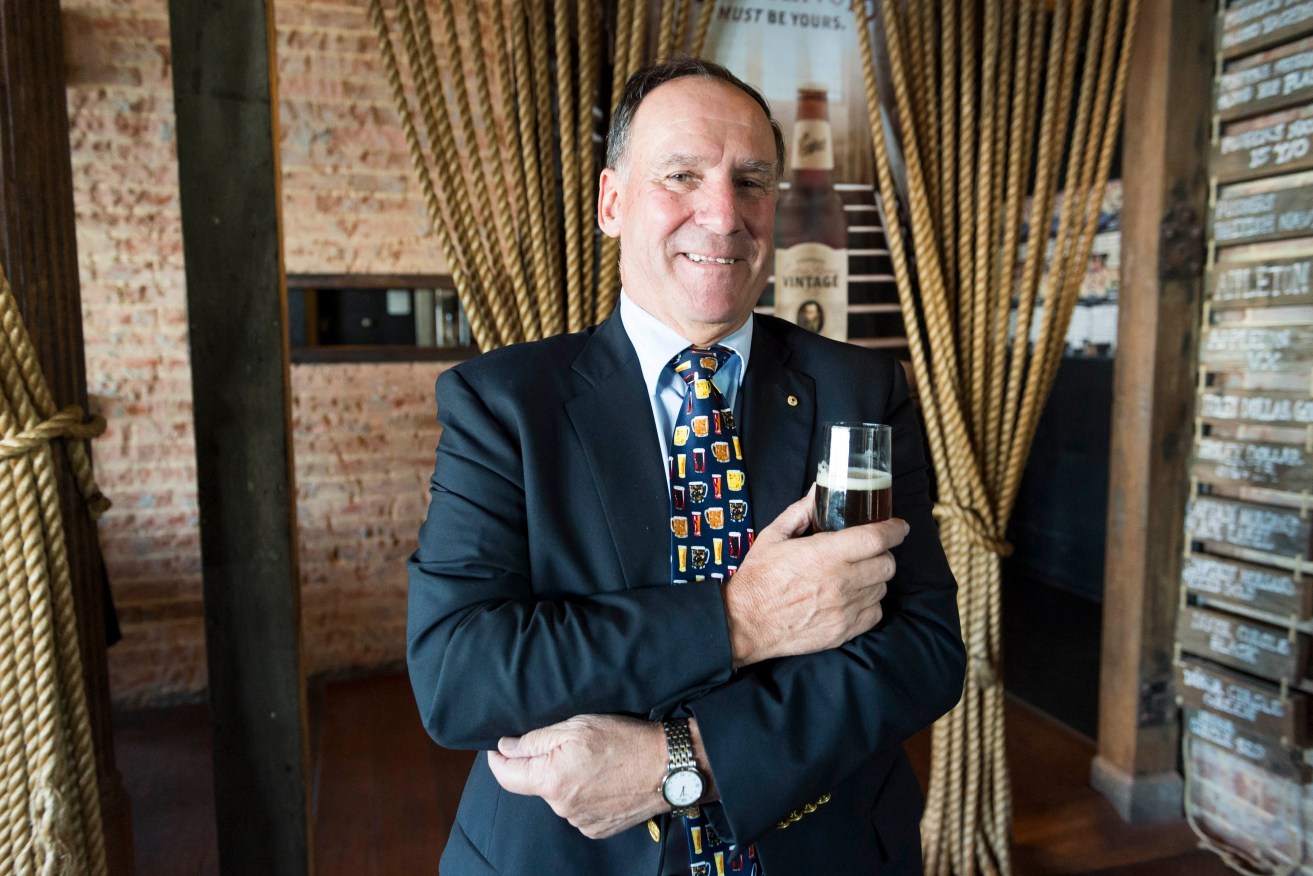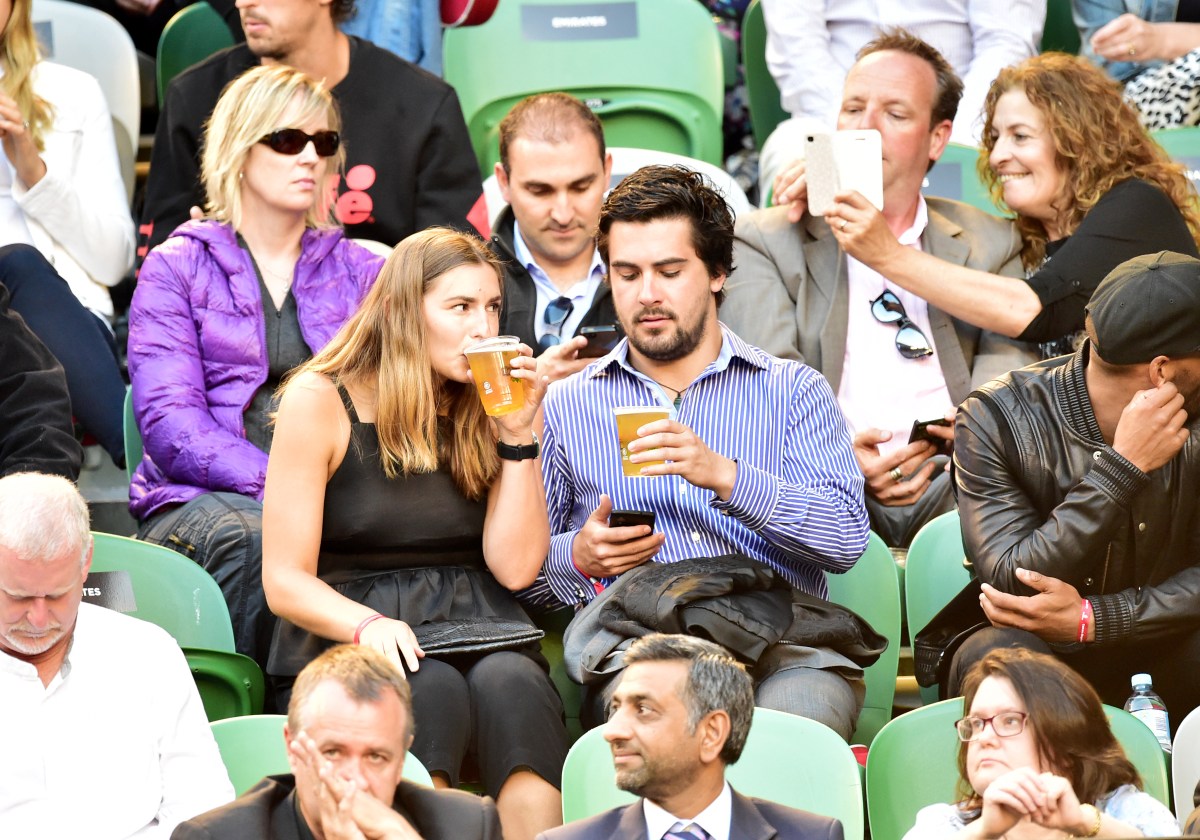Selling Coopers to the world: “Never give up on your family values”
Next week, Coopers will be showcased to the world as the official beer of the Australian Open. It’s the culmination of a journey that has seen the brand grow from a South Australian curio to a major national player. But the brewery has survived more than one near-death experience along the way, as chairman Glenn Cooper explained in a candid sitdown with Rooster Radio.


Glenn Cooper. Photo: Supplied
Of all the signs emblazoned with the distinctive Coopers logo plastered around Adelaide, there is one of which Glenn Cooper is most proud – the one that hangs above the bar at Adelaide Airport.
The fifth-generation Cooper, the chairman and former sales and marketing director of the family brewery, says he had the rights to the Coopers Bar “nailed down before the airport was even finished”.
“And I do like that, because it means when the Carlton United or Fosters or Lion executives come into town they know whose town they’re in,” he beams.
Small can compete with big… big doesn’t always do it right
Of course, these days the Coopers branding is just as visible in any other city at which those competitors might alight.
When Glenn and his cousin Tim joined the family business in 1990, he says around 68 per cent of the brewery’s product – which he estimated to be “probably 12 to 14 million litres” by volume – was sold in South Australia.
“Today we do over 80 million litres a year… 23 per cent is sold here and the rest is interstate and overseas,” he says.
That didn’t happen by accident, of course; and many times the Cooper family probably couldn’t see it happening at all. The company has staved off recessions, takeovers and intense competition as it developed and promoted its brand.
That brand will be showcased to the world at next week’s Australian Open, after the company – the largest Australian-owned brewer – last year snared exclusive pourage rights for the two-week tennis event, in a major coup that ended the two-decade monopoly of Dutch beer giant Heineken.
“We tipped out Heineken… so the Melbournites are going to have to drink Coopers,” Cooper tells Rooster Radio.
While the deal was snared after his retirement as Coopers marketing supremo, he notes that it took the company “quite a bit of work” to get it over the line.
However, he notes that the partnership is a logical one for the nation’s marquee tennis tournament.
“You’ve got an Australian Open, in this country, and you’re serving a European beer – it’s not a great promotion is it?” he muses.
Glenn Cooper grew up around beer.
The first time the distinctive taste of Sparkling Ale hit his tongue, he was “around nine”, although he insists it was a medical necessity; his tongue had been scorched by dry ice, so his father dumped a handy longneck of his famous brew down his throat to provide temporary relief!
He seems at pains to emphasise that it ain’t easy being a Cooper.
Despite the family imprimatur, he insists the business has never been simply handed down from generation to generation.
Indeed, it was quite the opposite: by his telling, the brewery operated for decades under a constant cloud of impending doom, fuelled by spiralling taxes, mounting debts and the market muscle of West End.
He tells a “famous” story about the time a senior West End executive put a condescending arm around one of the Cooper clan and said: ‘We love you Coopers – but we’re going to murder you.. we’re going to kill you.’
“It got tight – when I was leaving school, my father said ‘don’t worry about the brewery – it won’t make it’,” he recalls.
“Right from the start, you grew up with the brewery, and you realised that maybe it wasn’t going to survive.”
“Coopers was not really well known… it wasn’t known interstate, and all of the Coopers said ‘it won’t survive, so start doing your own thing’.”
That he did.

The remodelled airport Alehouse. Photo: Jessica Clark / CityMag
Glenn studied electronic engineering, computing and marketing, and went off to make his fortune in a digital technology firm, before returning to Adelaide to set up his own computer sales company.
His cousin Tim studied medicine and practiced for almost a decade, before taking time off to learn the science of brewing. The pair joined the family company in 1990 as directors, although even then, it was a long way to the top.
“[Tim] really picked up the ball on production, and I picked up sales and marketing,” Glenn recalls.
“We had to answer to other employees.”
The family business operates under the philosophy that any descendants under 30 “won’t be considered”, instead being told to “go and do your own thing, get qualifications, because the board will decide who comes in”. Otherwise, he insists, “after six generations, everyone will want a job!”
It’s advice he imparts to anyone building a generational family business: “Don’t turn around to the kids and say: ‘you’ll be ok because you’ll come into dad’s business’ [because] you might bring little Johnny and Mary into the business and they’re both duds!”
“During that period we changed a lot of things,” he says.
“The turning point for us was building the brand new brewery at Regency, and when Pale Ale took off it really took off – it went to the sky.”

Coopers will be the beer enjoyed by patrons – high profile and low – at next week’s Australian Open. Photo: Julian Smith / AAP
There were still challenges, notably including a 2005 hostile takeover bid by Lion Nathan, which offered shareholders in the public unlisted company $310 a share, which even Cooper as chairman conceded was “a very good offer”.
At an extraordinary general meeting, the directors asked the shareholders to insert a constitutional clause “that no other brewery can own shares in Coopers”. The motion gained around 94 per cent support.
We probably didn’t really have the right to sell it
Cooper recalls “a couple of old ladies came in [to the EGM] with a little sign around their neck saying ‘it’s not about the money’”.
“This may sound a bit of a cliché but we probably didn’t really have the right to sell it, after all the hard work done [over the generations],” he says.
“But the share price now is well above the $310 a share -without any takeover.”
The company has always traded on its family heritage.
When Glenn Cooper took the marketing reins, he brought in SA gurus Andrew Killey and Peter Withy from kwp!, who masterminded a series of guerilla-style campaigns around Sydney, taking out bus shelter ads telling residents that if their local pub doesn’t have Coopers on tap, they should “sell their house”.
“They were brilliant at doing campaigns that really put Coopers on the map,” Cooper says.
Beyond that, sponsorship of events such as the V8 supercars has helped build brand awareness around Australia.
“Every race they have, people have got to learn how to drink Coopers… we shocked ‘em the first year up in Queensland: they’d never heard of another beer besides XXXX,” Cooper laughs.
Sporting sponsorships, culminating in the Open, have built up after starting “law end” with events such as the Adelaide Fringe, of which Glenn is a former chairman.
“We knew we would never be able to do AFL or cricket,” he says, adding that neither would suit the brand, “not now”.
“It’s a slow process,” he says.
“If you build a knowledge of the brand the sales will come – providing the product’s good enough.
“One of the major challenges – and I’ve driven this into my family – is you carry a really well-respected name: don’t be the one to mess it up!
“It’s about protecting that name that’s been built over many years.”
It’s the reason the cousins make themselves a public focus of the brand: “because the others don’t”.
“Small can compete with big,” Cooper insists.
“Just make sure you don’t get caught up in what big does, because big doesn’t always do it right.
“I can tell you now there’s corporate-structure companies that get it very wrong, and you don’t have to get caught up in what they do… you may be in the same market, selling the same products, but just do what you can do that’s different to them.”
Of course, these days the problem for Coopers is quite the opposite; they’re widely considered too big to be the niche brewer on which their reputation was forged.
We get these little trendy places doing craft beers, and I say ‘Bugger you, we started it!’
Cooper says while the explosion of craft beers has brought new competition, it’s also “grown the pie” by expanding the market.
“The biggest frustration I have – and it’s more so in Adelaide than anywhere else in Australia – we get these little trendy places doing craft beers and they turn around and say: ‘You’re too big to be craft’.
“And I say ‘Bugger you, we started it! We’re the grandfather of craft!”
“And they say, ‘but you’re too well known’, and it’s like ‘holy shit, where are you going sunshine? I don’t know if you’ll be around in about eight months!’
“Some of the craft beers, they’ll taste different every month… to run a business you need nice base products that are reliable, quality-wise, and then you can play around with the craft ones.”
It was a similar story when the company first “played around” with home brew, of which they are now the world’s largest supplier.
“We were chastised enormously by hoteliers, absolutely belted, because it was seen as shooting yourself in the foot: ‘there’s a brewery making a home brew, encouraging people to make beer at home – how stupid’s that?’
“But let me tell you, it saved the brewery.”
The journey, he says, has been “fantastic” – but never easy.
“All the Coopers work very hard; it’s not 9-to-5 or partying all over the place… it’s not easy, it’s a very, very competitive market and we’ve had to make some big decisions about where we go,” he says.
Cooper wants to see a business environment that fosters other family enterprises – and risk-taking.
“One of the things that frustrates me in Australia is the fact we’re so risk averse – everything’s risk averse… you cannot create innovation and creativity in a risk-averse environment, because they don’t go together.
“Innovation and creativity involve risk.”
His advice to family-owned businesses sounds a little like a famous line from The Godfather.
“Never give up on your family values,” he says.
“Build a culture in the company, because there’s no culture in the large corporations… their culture is always fragmented, because the next CEO comes in and changes it.”
The culture, he insists, is the backbone, the spine, of a successful company.
Rooster Radio appears regularly in InDaily.




